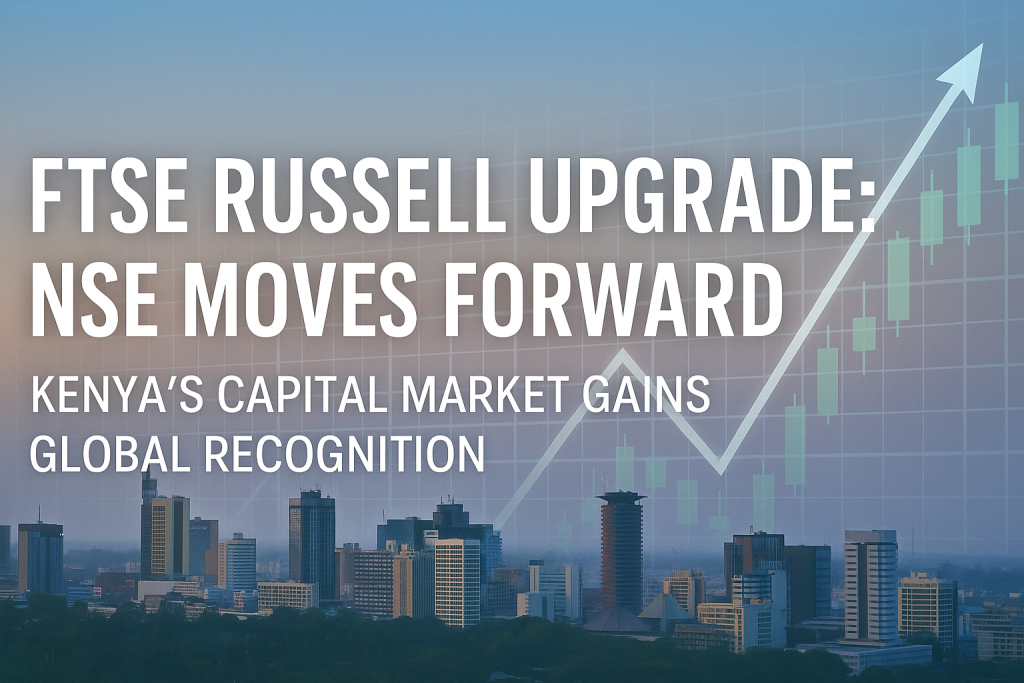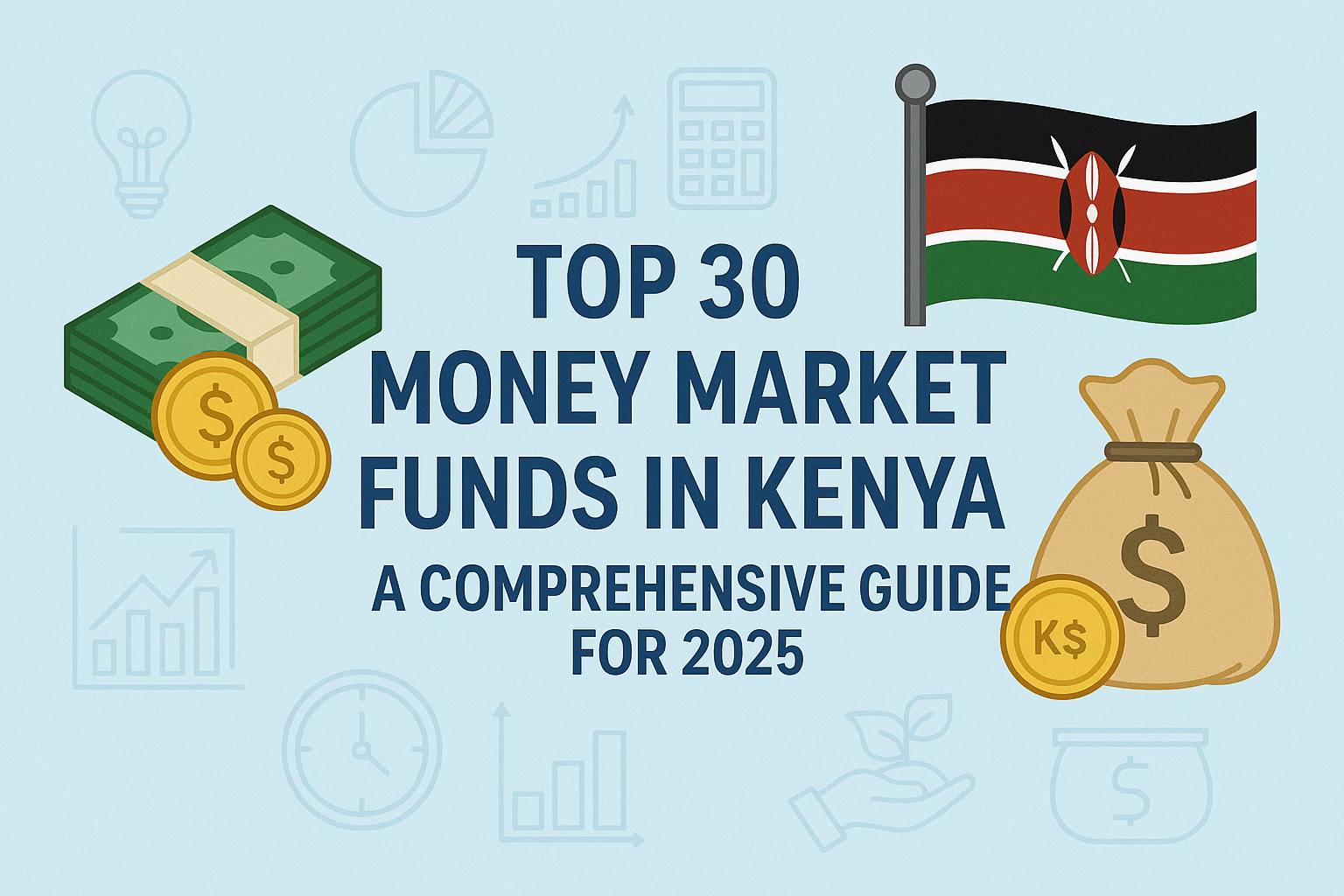The Nairobi Securities Exchange (NSE) recently achieved a significant milestone: in September 2025, the global index provider FTSE Russell upgraded Kenya’s equity market classification on the Efficient Trading Mechanism criterion, moving the NSE from “Restricted” to “Pass.” This development is widely being interpreted as a validation of recent reforms—especially the shift to single-share trading that took effect on August 1, 2025—which collectively aim to improve market accessibility, credibility, and liquidity.
In this blog post, we explore:
- What the FTSE Russell upgrade entails
- Why it matters (for investors, issuers, Kenya’s capital markets)
- Key reforms that underpinned the upgrade
- Opportunities, risks, and what to watch ahead
Understanding the FTSE Russell Upgrade
What is the Efficient Trading Mechanism criterion?
FTSE Russell evaluates national equity markets across multiple technical and operational criteria as part of its Equity Country Classification regime. One of these is Efficient Trading Mechanism. This dimension examines whether a market supports smooth, transparent, efficient trading. Among other things, it assesses:
- Whether orders are executed via electronic matching systems
- The transparency of pricing and displays of bids/offers
- The absence of unnecessary trade barriers (e.g. minimum lot restrictions)
- Adequate settlement, clearing, and operational infrastructure
- Reasonable transaction costs and minimal latency
A “Pass” rating means the market meets the minimum acceptable standard in that dimension; “Restricted” suggests there are lingering structural or operational constraints. The upgrade for NSE thus signals that FTSE Russell now considers Kenya’s exchange to be sufficiently efficient under its metrics.
What changed for Kenya’s NSE?
As part of the FTSE Equity Country Classification Interim Review in September 2025, the NSE’s classification on the Efficient Trading Mechanism was upgraded, specifically recognizing the implementation of more flexible and inclusive trading rules.
Most importantly, the reform allowing single share trading on the main board (eliminating the old minimum of 100 shares per trade) was cited as a key enabler. This change removed a structural barrier and helped align the exchange with global trading norms.
NSE leadership welcomed the upgrade as validation of their modernization and inclusion agenda. Frank Mwiti, CEO of NSE, described it as a strong endorsement of reforms aimed at democratizing investment and positioning Kenya as a more attractive destination for both local and global capital.
Why the Upgrade Matters
The FTSE Russell upgrade is more than symbolic; it has practical implications for Kenya’s capital markets, investor confidence, and the broader financial ecosystem.
Attracting global capital
Many institutional investors and passive funds (e.g. index funds, ETFs) use FTSE Russell classifications as a benchmark when evaluating frontier or emerging markets. A “Pass” on Efficient Trading Mechanism may reduce perceived entry barriers and operational risk for those considering exposure to Kenyan equities.
Even if this upgrade by itself does not immediately shift Kenya’s full market status (i.e. move from frontier to emerging), it strengthens the narrative that Kenya is continuing on a path of structural reform.
Boosting investor confidence
For domestic and international investors alike, the upgrade signals that Kenya’s market operations are being taken seriously. When an external, respected benchmark validates the operational robustness of the exchange, it can help reduce perceived risk.
This boost in confidence may lead to more participation, especially from institutional investors who require transparent, rule-based markets.
Reinforcing structural reforms
The upgrade reinforces and rewards prior and ongoing reforms—for instance, adjusting trading rules, enhancing technology, and improving market access. It helps to cement those changes and provides a benchmark to aim for further improvements.
Signaling to regional peers
As Kenya competes with other African capital markets for investor attention and capital flow, this upgrade enhances its differentiation. It strengthens Kenya’s positioning in regional capital market competition (e.g. relative to exchanges in Nigeria, South Africa, etc.).
Reforms That Led to the Upgrade
To understand why FTSE Russell moved NSE’s classification, it helps to zoom into the reforms and initiatives that preceded it. Below are the most notable ones often mentioned in coverage.
Single share trading (removal of minimum lot rule)
Perhaps the most visible reform was enabling trading in multiples of one share (i.e. single-unit trading) across the main board. This change removed the old mandatory minimum of 100 shares per trade, which had been a barrier for smaller investors.
That reform enhances flexibility and democratizes access—important in FTSE’s assessment of whether the market is accessible, efficient, and devoid of unnecessary constraints.
Infrastructure, technology, and trade execution improvements
Media coverage highlights enhancements in trading infrastructure, matching systems, and transaction handling to reduce latency, improve reliability, and ensure smoother execution.
These improvements bolster the “efficient trading” dimension’s technical requirements—i.e., that orders are handled in an automated, transparent, and timely manner.
Market access, transparency, and rule changes
Complementing the structural changes, the NSE and associated regulators introduced rule updates to reduce friction in trading, improve transparency, and align market access with global norms. Some of these include clearer order types, better disclosure, and aligning listing/price discovery rules.
Alignment of classification timelines
The timing of these reforms was strategic. The single share trading rule was effective August 1, 2025, just before the FTSE Russell Interim review period. Because the reform was already in place, it could be evaluated in that review.
Benefits, Opportunities & Challenges Post-Upgrade
Let’s examine how different stakeholders stand to gain or face challenges in light of the FTSE Russell upgrade.
For retail and institutional investors
Opportunities
- Easier access to more counters (especially high-nominal price ones)
- Potentially narrower spreads and greater liquidity over time as participation increases
- External validation aiding confidence and signaling reduced structural risk
Challenges
- Some counters may remain illiquid despite the reform
- Costs and execution in small tickets may still be significant relative to returns
- Volatility in small or thinly traded counters may increase
For listed companies
Benefits
- Broader investor base (more retail and institutional interest)
- Greater potential for liquidity, which may support valuation multiples
- Improved visibility and potentially stronger governance pressure from more engaged shareholding
Challenges
- More volatile trading in certain counters
- Increased demand for investor relations and transparency
- Greater scrutiny from global investors
For NSE, brokers & fintechs
Opportunities
- Growth in trading volumes and commission streams
- Innovation in tools, micro-investing, fractional aggregators, etc.
- Greater attractiveness to funds and regional listing competition
Challenges
- Scaling technology and execution infrastructure to cope with increased order volume
- Ensuring fair execution and avoiding manipulation
- Revising commission and fee structures to remain competitive
Systemic & regulatory risks
- Need for vigilant surveillance to prevent market abuse and manipulative small trades
- Maintaining the integrity of reference and closing prices, especially in low-volume counters
- Upkeep of technology resilience, especially during periods of high volatility
What to Watch in the Months Ahead
The FTSE upgrade is a milestone—but real tests lie ahead. Here are signals and developments to track:
- Incremental foreign capital inflows
Watch whether foreign institutional flows start increasing as a result of the upgrade. - Volume trajectories across counters
See which stocks see the biggest increases in daily trades and whether previously dormant counters become more active. - Spread and cost behavior
Monitor whether bid-ask spreads compress over time, especially in smaller counters, and whether brokerages reduce or repackage fees to facilitate micro trading. - Market infrastructure performance
Observe how trading systems perform under stress—any outages or delays could undermine confidence. - Regulatory responses & further reforms
Look for additional tweaks from the Capital Markets Authority (CMA) or NSE to further reduce friction, bolster investor protection, or adjust rules based on early learning. - Company responses & governance
Monitor how listed firms engage with the broader investor base, including investor education, disclosure improvements, and outreach. - Index inclusion & reclassification moves
Over time, if more criteria are met, Kenya may push for broader recognition in more global indices—this FTSE upgrade could be one stepping stone.
Conclusion
The FTSE Russell upgrade of the Nairobi Securities Exchange from “Restricted” to “Pass” on the Efficient Trading Mechanism dimension is a landmark moment for Kenya’s capital markets. It validates recent reforms—chief among them, single share trading—and signals that the NSE is converging toward global operational standards.
While the upgrade does not automatically transform Kenya into a top-tier market overnight, it does strengthen the narrative of progress and opens doors to new investor interest. For investors, issuers, and intermediaries alike, the path forward will require careful execution, adaptation, and sustained improvements. But if momentum holds, this could be a pivotal chapter in Kenya’s evolution as a more accessible, efficient, and globally integrated capital market.
Frequently Asked Questions (FAQs) About the FTSE Russell Upgrade of the NSE
What does it mean that the NSE was upgraded by FTSE Russell?
FTSE Russell evaluates equity markets globally using a set of technical and operational criteria. The Nairobi Securities Exchange (NSE) was previously rated “Restricted” on the Efficient Trading Mechanism criterion. In September 2025, it was upgraded to “Pass,” meaning Kenya’s stock market now meets international standards for smooth, transparent, and efficient trade execution. This signals to investors that the NSE has improved in terms of accessibility, operational structure, and reliability.
Why is the Efficient Trading Mechanism criterion important?
This criterion measures how effectively a stock exchange processes trades. It looks at order matching, electronic systems, transparency of bids and offers, trading costs, and restrictions such as minimum share sizes. A “Pass” rating tells global investors that the NSE now provides an efficient trading environment comparable to other reputable exchanges.
What reforms led to the NSE’s upgrade?
The most notable reform was the introduction of single-share trading in August 2025, which removed the 100-share minimum per trade. This step made the market more accessible for retail investors. Other improvements included upgrading trading systems for faster execution, streamlining rules for new listings, and enhancing market transparency. Together, these reforms convinced FTSE Russell that Kenya’s market had made substantial progress.
How does this benefit investors?
For local retail investors, the reforms lower barriers to entry, making it easier to buy into high-priced stocks without needing large amounts of money. For institutional and foreign investors, the FTSE Russell upgrade reduces concerns about market inefficiency, making Kenya a more attractive destination for portfolio allocations. Over time, this can lead to increased liquidity, tighter spreads, and potentially stronger valuations for listed companies.
Will this change bring more foreign capital into Kenya?
While the upgrade itself doesn’t automatically guarantee an immediate surge of foreign investment, it improves Kenya’s standing in the eyes of global funds that rely on FTSE Russell benchmarks. It signals progress toward eventual reclassification in global equity indices. If sustained reforms continue, Kenya could attract more long-term institutional inflows.
Does the upgrade mean Kenya is now an emerging market?
Not yet. Kenya is still classified as a frontier market overall. The “Pass” on Efficient Trading Mechanism is one of several steps required before the country can be considered for a move to emerging market status. However, it’s a significant milestone that puts Kenya on a stronger path toward future upgrades.
What does this mean for listed companies on the NSE?
Listed firms may benefit from greater liquidity and visibility, as more investors—both local and foreign—can comfortably trade their shares. A larger shareholder base can also enhance corporate governance pressure. However, companies may also face more scrutiny and need to strengthen investor relations and disclosures.
Are there risks associated with the upgrade?
Yes. While reforms improve market access, challenges remain. Some counters may still suffer from low liquidity. Increased retail participation could lead to more short-term speculation and volatility. Transaction costs also remain a factor for very small trades. Moreover, regulators must ensure strict surveillance to prevent manipulation as trading activity increases.
What should retail investors do in light of this development?
Retail investors should take advantage of the lower entry barriers but remain disciplined. It’s wise to focus on fundamentals, diversify portfolios, and avoid excessive speculation. Understanding brokerage costs is also critical, as fees can significantly affect returns on small trades.



